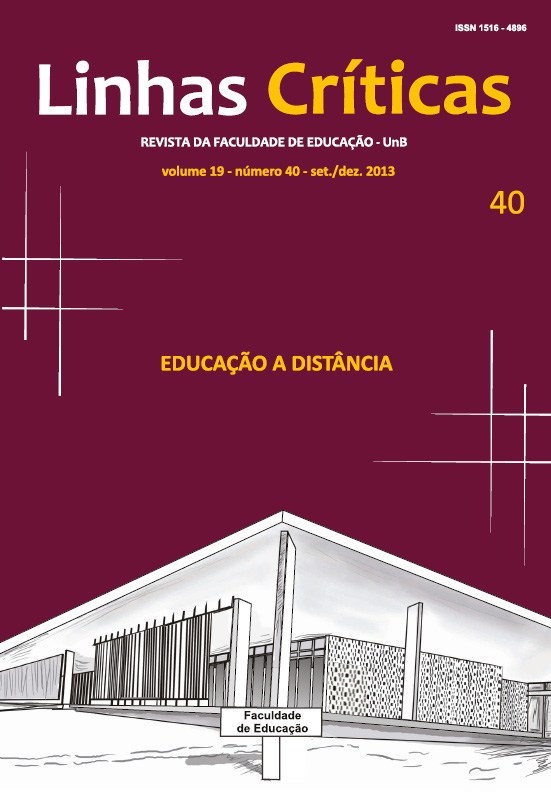Conceptions of the tutors in the Unesp/Univesp program about distance education
DOI:
https://doi.org/10.26512/lc.v19i40.4196Keywords:
Conceptions, Tutor Profile, Teacher Training, Distance LearningAbstract
This text presents the profiles of the tutors in the Unesp/Univesp program and discusses their conceptions of different aspects of distance education. This was accomplished by presenting a questionnaire to 41 tutors. The results show that, in general, the tutors believe that distance education is capable of offering quality teacher training, and consider the tutoring work indispensable to guarantee the quality of the interactions among students. A considerable number of tutors considered the educational materials highly valuable for the learning process. Their conceptions also showed that there is still strong prejudice against distance learning in the labor market.
Downloads
References
ALONSO, Myrtes; ALEGRETTI, Sonia Maria. Introduzindo a pesquisa na formação de professor a distância. In: ALMEIDA, Maria Elisabette Bianconcini. et al (orgs). Educação a distância via internet. São Paulo: Avercamp, 2003.
BELLONI, Maria Luiza. Educação a Distância. Campinas: Autores Associados, 2003.
BELLONI, Maria Luiza. Educação a distância. Campinas: Autores Associados, 2009.
BRASIL. MEC. Secretaria de Educação a Distância. Referenciais de qualidade para educação superior a distância, 2007. Disponível em: <http://portal.mec.gov.br/seed>. Acesso em: 09 set. 2011.
BRASIL. Lei nº 9.394, de 20 de dezembro de 1996. Estabelece as diretrizes e bases da educação nacional. Diário Oficial da República Federativa do Brasil, Brasília, DF, 23 dez. 1996. Disponível em: <http://portal.mec.gov.br/arquivos/pdf/diretrizes.pdf>. Acesso em: 04 jul. 2011.
BRASIL. MEC. Secretaria de Educação a Distância. Decreto nº 5.800, de 8 de junho de 2006. Dispõe sobre o Sistema Universidade Aberta do Brasil ”“ UAB. Disponível em: <http://www.planalto.gov.br/ccivil_03/_ato2004-2006/2006/decreto/d5800.htm>. Acesso em: 12 fev. 2012.
DIAS SOBRINHO, José. Democratização, qualidade e crise da educação Superior: faces da exclusão e limites da inclusão. Educação e Sociedade. Campinas, v. 31, n. 113, p. 1223-1245, out.-dez. 2010.
GARCÃA ARETIO, Lorenzo. La educación a distância. Uma visión global. Boletín Llustre Colegio de Doctores y licenciados de España. 2003. Disponível em: . Acesso em: 17 dez. 2011.
GARNICA, A. V. M. Um ensaio sobre as concepções de professores de matemática: possibilidades metodológicas e um exercício de pesquisa. Educação e Pesquisa: São Paulo, v.34, n.3. p.495-510, set.-dez. 2008.
GAYTAN, Jorge; MCEWEN, Beryl. Effective online instructional and assessment strategies. The American Journal of Distance Education. p. 117-132.2007. Disponível em: <http://onlinelearningassessment.pbworks.com/f/gaytan.pdf>. Acesso em: 22 jan. 2012.
GIOLO, Jaime. A educação a distância e a formação de professores. Educação e Sociedade. Campinas, vol. 29, n. 105, p. 1211-1234, set.-dez. 2008. Disponível em: <http://www.cedes.unicamp.br>. Acesso em: 07 dez. 2011.
KENSKI, Vani Moreira. Novas tecnologias: o redimensionamento do espaço e do tempo e os impactos no trabalho docente. Revista Brasileira de Educação, nº 08, Mai/Jun/Jul/Ago, 1998. Disponível em: <http://educa.fcc.org.br/pdf/rbedu/n08/n08 a06.pdf>. Acesso em: 25 maio 2010.
LAPA, Andrea; PRETTO, Nelson de Luca. Educação a distância e precarização do trabalho docente. Em Aberto, Brasília, v. 23, n. 84, p. 79-97, nov. 2010.
MAGGIO, Mariana. O tutor na educação a distância. In: LITWIN, Edith. (org.). Educação a Distância. Porto Alegre: Artmed, 2001, p. 93-110.
MILL, Daniel. Sobre o conceito de polidocência ou sobre a natureza de trabalho pedagógico na Educação a Distância. In: MILL, Daniel; OLIVEIRA, M. R. G.; RIBEIRO, L. R. C. (Org.) Polidocência na educação a distância: múltiplos enfoques. São Carlos: EDUFSCar, 2010.
MOORE, Michael; KEARSLEY, Greg. Educação a distância: uma visão integrada. São Paulo: Cengage Learning, 2008.
NEDER, Maria Lúcia Cavalli. O texto como elemento de mediação entre os sujeitos da ação educativa. In: POSSARI, Lucia Helena Vendrúsculo; NEDER, Maria Lúcia Cavalli. Material Didático para a EaD: Processo de Produção. Cuiabá: EdUFMT, 2009.
PADULA, Jorge. Eduardo. Contigo em La distancia: el rol del tutor em La educación no presencial, 2002. Disponível em: <http://www.uned.es/catedraunescoead/ publicued/ pbc08/ rol_ bened.htm>. Acesso em: 27 nov. 2012.
PALLOFF, Rena; PRATT, Keith. O aluno virtual: um guia para trabalhar com estudantes on-line. Porto Alegre: Artmed, 2004.
PRETI, Oreste. O estado da arte sobre “tutoria”: modelos e teorias em construção. In: PRETI, O. O sistema de Orientação Acadêmica no curso de Pedagogia a distância da Universidade Federal de Mato Grosso. Programa CAERENAD, 2005.
SCHLEMMER, Eliane. Formação de professores na modalidade online: experiências e reflexões sobre a criação de espaços de convivências digitais virtuais. Em Aberto, v. 23, n. 84, p. 99-122, nov. 2010.
UNESP. Projeto Pedagógico do curso de Pedagogia semipresencial, 2008. 35 pg. Disponível em: <http://www.edutec.unesp.br/images/portal/ementas/completo1.pdf>. Acesso em: 21 nov. 2012.
Downloads
Published
How to Cite
Issue
Section
License
Copyright (c) 2016 Linhas Críticas

This work is licensed under a Creative Commons Attribution 4.0 International License.
Authors who publish in this journal agree to the following terms:
-Authors maintains the copyright and grants the journal the right of first publication, the work being simultaneously licensed under the Creative Commons Attribution License which allows the sharing of the work with recognition of the authorship of the work and initial publication in this journal.
- Authors are authorized to enter into additional contracts separately, for non-exclusive distribution of the version of the work published in this journal (eg publish in institutional repository or as a book chapter), with acknowledgment of authorship and initial publication in this journal.
-Authorers are allowed and encouraged to publish and distribute their work online (eg in institutional repositories or on their personal page) at any point before or during the editorial process, as this can generate productive changes as well as increase the impact and the citation of published work (See The Effect of Free Access).



